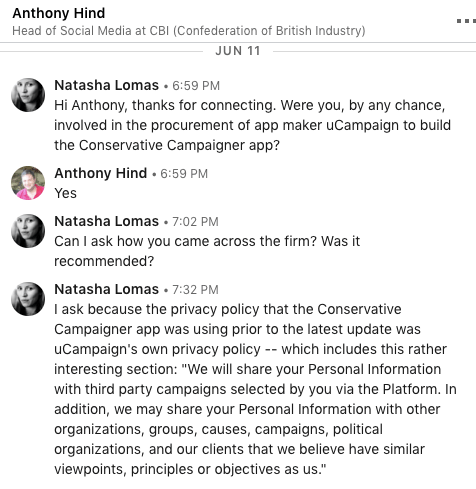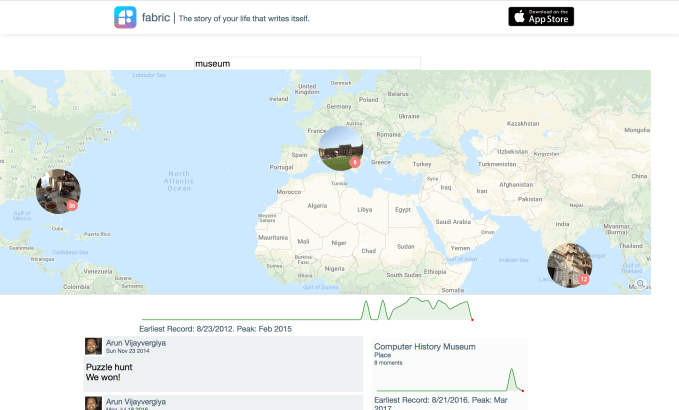A UK parliamentary committee which has been running a multi-month investigation into the impact of online disinformation on political campaigning — and on democracy itself — has published a preliminary report highlighting what it describes as “significant concerns” over the risks to “shared values and the integrity of our democratic institutions”.
It’s calling for “urgent action” from government and regulatory bodies to “build resilience against misinformation and disinformation into our democratic system”.
“We are faced with a crisis concerning the use of data, the manipulation of our data, and the targeting of pernicious views,” the DCMS committee warns. “In particular, we heard evidence of Russian state-sponsored attempts to influence elections in the US and the UK through social media, of the efforts of private companies to do the same, and of law-breaking by certain Leave campaign groups in the UK’s EU Referendum in their use of social media.”
The inquiry, which was conceived of and begun in the previous UK parliament — before relaunching in fall 2017, after the June General Election — has found itself slap-bang in the middle of one of the major scandals of the modern era, as revelations about the extent of disinformation and social media data misuse and allegations of election fiddling and law bending have piled up thick and fast, especially in recent months (albeit, concerns have been rising steadily, ever since the 2016 US presidential election and revelations about the cottage industry of fake news purveyors spun up to feed US voters, in addition to Kremlin troll farm activity.)
Yet the Facebook-Cambridge Analytica data misuse saga (which snowballed into a major global scandal this March) is just one of the strands of the committee’s inquiry. Hence they’ve opted to publish multiple reports — the initial one recommending urgent actions for the government and regulators, which will be followed by another report covering the inquiry’s “wider terms of reference” and including a closer look at the role of advertising. (The latter report is slated to land in the fall.)
For now, the committee is suggesting “principle-based recommendations” designed to be “sufficiently adaptive to deal with fast-moving technological developments”.
Among a very long list of recommendations are:
- a levy on social media and tech giants to fund expanding a “major investment” in the UK’s data watchdog so the body is able to “attract and employ more technically-skilled engineers who not only can analyse current technologies, but have the capacity to predict future technologies” — with the tech company levy operating in “a similar vein to the way in which the banking sector pays for the upkeep of the Financial Conduct Authority”. Additionally, the committee also wants the government put forward proposals for an educational levy to be raised by social media companies, “to finance a comprehensive educational framework (developed by charities and non-governmental organisations) and based online”. “Digital literacy should be the fourth pillar of education, alongside reading, writing and maths,” the committee writes. “The DCMS Department should co-ordinate with the Department for Education, in highlighting proposals to include digital literacy, as part of the Physical, Social, Health and Economic curriculum (PSHE). The social media educational levy should be used, in part, by the government, to finance this additional part of the curriculum.” It also wants to see a rolling unified public awareness initiative, part-funded by a tech company levy, to “set the context of social media content, explain to people what their rights over their data are… and set out ways in which people can interact with political campaigning on social media. “The public should be made more aware of their ability to report digital campaigning that they think is misleading, or unlawful,” it adds
- amendments to UK Electoral Law to reflect use of new technologies — with the committee backing the Electoral Commission’s suggestion that “all electronic campaigning should have easily accessible digital imprint requirements, including information on the publishing organisation and who is legally responsible for the spending, so that it is obvious at a glance who has sponsored that campaigning material, thereby bringing all online advertisements and messages into line with physically published leaflets, circulars and advertisements”. It also suggests government should “consider the feasibility of clear, persistent banners on all paid-for political adverts and videos, indicating the source and making it easy for users to identify what is in the adverts, and who the advertiser is”. And urges the government to carry out “a comprehensive review of the current rules and regulations surrounding political work during elections and referenda, including: increasing the length of the regulated period; definitions of what constitutes political campaigning; absolute transparency of online political campaigning; a category introduced for digital spending on campaigns; reducing the time for spending returns to be sent to the Electoral Commission (the current time for large political organisations is six months)”.
- the Electoral Commission to establish a code for advertising through social media during election periods “giving consideration to whether such activity should be restricted during the regulated period, to political organisations or campaigns that have registered with the Commission”. It also urges the Commission to propose “more stringent requirements for major donors to demonstrate the source of their donations”, and backs its suggestion of a change in the rules covering political spending so that limits are put on the amount of money an individual can donate
- a major increase in the maximum fine that can be levied by the Electoral Commission (currently just £20,000) — saying this should rather be based on a fixed percentage of turnover. It also suggests the body should have the ability to refer matters to the Crown Prosecution Service, before their investigations have been completed; and urges the government to consider giving it the power to compel organisations that it does not specifically regulate, including tech companies and individuals, to provide information relevant to their inquiries, subject to due process.
- a public register for political advertising — “requiring all political advertising work to be listed for public display so that, even if work is not requiring regulation, it is accountable, clear, and transparent for all to see”. So it also wants the government to conduct a review of UK law to ensure that digital campaigning is defined in a way that includes online adverts that use political terminology but are not sponsored by a specific political party.
- a ban on micro-targeted political advertising to lookalikes online, and a minimum limit for the number of voters sent individual political messages to be agreed at a national level. The committee also suggests the Electoral Commission and the ICO should consider the ethics of Facebook or other relevant social media companies selling lookalike political audiences to advertisers during the regulated period, saying they should consider whether users should have the right to opt out from being included in such lookalike audiences
- a recommendation to formulate a new regulatory category for tech companies that is not necessarily either a platform or a publisher, and which “tightens tech companies’ liabilities”
- a suggestion that the government consider (as part of an existing review of digital advertising) whether the Advertising Standards Agency could regulate digital advertising. “It is our recommendation that this process should establish clear legal liability for the tech companies to act against harmful and illegal content on their platforms,” the committee writes. “This should include both content that has been referred to them for takedown by their users, and other content that should have been easy for the tech companies to identify for themselves. In these cases, failure to act on behalf of the tech companies could leave them open to legal proceedings launched either by a public regulator, and/or by individuals or organisations who have suffered as a result of this content being freely disseminated on a social media platform.”
- another suggestion that the government consider establishing a “digital Atlantic Charter as a new mechanism to reassure users that their digital rights are guaranteed” — with the committee also raising concerns that the UK risks a privacy loophole opening up after it leave the EU when US-based companies will be able to take UK citizens’ data to the US for processing without the protections afforded by the EU’s GDPR framework (as the UK will then be a third country)
- a suggestion that a professional “global Code of Ethics” should be developed by tech companies, in collaboration with international governments, academics and other “interested parties” (including the World Summit on Information Society), in order to “set down in writing what is and what is not acceptable by users on social media, with possible liabilities for companies and for individuals working for those companies, including those technical engineers involved in creating the software for the companies”. “New products should be tested to ensure that products are fit-for-purpose and do not constitute dangers to the users, or to society,” it suggests. “The Code of Ethics should be the backbone of tech companies’ work, and should be continually referred to when developing new technologies and algorithms. If companies fail to adhere to their own Code of Ethics, the UK Government should introduce regulation to make such ethical rules compulsory.”
- the committee also suggests the government avoids using the (charged and confusing) term ‘fake news’ — and instead puts forward an agreed definition of the words ‘misinformation’ and ‘disinformation’. It should also support research into the methods by which misinformation and disinformation are created and spread across the internet, including support for fact-checking. “We recommend that the government initiate a working group of experts to create a credible annotation of standards, so that people can see, at a glance, the level of verification of a site. This would help people to decide on the level of importance that they put on those sites,” it writes
- a suggestion that tech companies should be subject to security and algorithmic auditing — with the committee writing: “Just as the finances of companies are audited and scrutinised, the same type of auditing and scrutinising should be carried out on the non-financial aspects of technology companies, including their security mechanisms and algorithms, to ensure they are operating responsibly. The Government should provide the appropriate body with the power to audit these companies, including algorithmic auditing, and we reiterate the point that the ICO’s powers should be substantially strengthened in these respects”. The committee also floats the idea that the Competition and Markets Authority considers conducting an audit of the operation of the advertising market on social media (given the risk of fake accounts leading to ad fraud)
- a requirement for tech companies to make full disclosure of targeting used as part of advert transparency. The committee says tech companies must also address the issue of shell corporations and “other professional attempts to hide identity in advert purchasing.
How the government will respond to the committee’s laundry list of recommendations for cleaning up online political advertising remains to be seen, although the issue of Kremlin-backed disinformation campaigns was at least raised publicly by the prime minister last year. Although Theresa May has been rather quieter on revelations about EU referendum-related data misuse and election law breaches.
While the committee uses the term “tech companies” throughout its report to refer to multiple companies, Facebook specifically comes in for some excoriating criticism, with the committee accusing the company of misleading by omission and actively seeking to impede the progress of the inquiry.
It also reiterates its call — for something like the fifth time at this point — for founder Mark Zuckerberg to give evidence. Facebook has provided several witnesses to the committee, including its CTO, but Zuckerberg has declined its requests he appear, even via video link. (And even though he did find time for a couple of hours in front of the EU parliament back in May.)
The committee writes:
We undertook fifteen exchanges of correspondence with Facebook, and two oral evidence sessions, in an attempt to elicit some of the information that they held, including information regarding users’ data, foreign interference and details of the so-called ‘dark ads’ that had reached Facebook users. Facebook consistently responded to questions by giving the minimal amount of information possible, and routinely failed to offer information relevant to the inquiry, unless it had been expressly asked for. It provided witnesses who have been unwilling or unable to give full answers to the Committee’s questions. This is the reason why the Committee has continued to press for Mark Zuckerberg to appear as a witness as, by his own admission, he is the person who decides what happens at Facebook.
…
Tech companies are not passive platforms on which users input content; they reward what is most engaging, because engagement is part of their business model and their growth strategy. They have profited greatly by using this model. This manipulation of the sites by tech companies must be made more transparent. Facebook has all of the information. Those outside of the company have none of it, unless Facebook chooses to release it. Facebook was reluctant to share information with the Committee, which does not bode well for future transparency. We ask, once more, for Mr Zuckerberg to come to the Committee to answer the many outstanding questions to which Facebook has not responded adequately, to date.
The committee suggests that the UK’s Defamation Act 2013 means Facebook and other social media companies have a duty to publish and to follow transparent rules — arguing that the Act has provisions which state that “if a user is defamed on social media, and the offending individual cannot be identified, the liability rests with the platform”.
“We urge the government to examine the effectiveness of these provisions, and to monitor tech companies to ensure they are complying with court orders in the UK and to provide details of the source of disputed content– including advertisements — to ensure that they are operating in accordance with the law, or any future industry Codes of Ethics or Conduct. Tech companies also have a responsibility to ensure full disclosure of the source of any political advertising they carry,” it adds.
The committee is especially damning of Facebook’s actions in Burma (as indeed many others have also been), condemning the company’s failure to prevent its platform from being used to spread hate and fuel violence against the Rohingya ethnic minority — and citing the UN’s similarly damning assessment.
“Facebook has hampered our efforts to get information about their company throughout this inquiry. It is as if it thinks that the problem will go away if it does not share information about the problem, and reacts only when it is pressed. Time and again we heard from Facebook about mistakes being made and then (sometimes) rectified, rather than designing the product ethically from the beginning of the process. Facebook has a ‘Code of Conduct’, which highlights the principles by which Facebook staff carry out their work, and states that employees are expected to “act lawfully, honestly, ethically, and in the best interests of the company while performing duties on behalf of Facebook”. Facebook has fallen well below this standard in Burma,” it argues.
The committee also directly blames Facebook’s actions for undermining the UK’s international aid efforts in the country — writing:
The United Nations has named Facebook as being responsible for inciting hatred against the Rohingya Muslim minority in Burma, through its ‘Free Basics’ service. It provides people free mobile phone access without data charges, but is also responsible for the spread disinformation and propaganda. The CTO of Facebook, Mike Schroepfer described the situation in Burma as “awful”, yet Facebook cannot show us that it has done anything to stop the spread of disinformation against the Rohingya minority.
The hate speech against the Rohingya—built up on Facebook, much of which is disseminated through fake accounts—and subsequent ethnic cleansing, has potentially resulted in the success of DFID’s [the UK Department for International Development] aid programmes being greatly reduced, based on the qualifications they set for success. The activity of Facebook undermines international aid to Burma, including the UK Government’s work. Facebook is releasing a product that is dangerous to consumers and deeply unethical. We urge the Government to demonstrate how seriously it takes Facebook’s apparent collusion in spreading disinformation in Burma, at the earliest opportunity. This is a further example of Facebook failing to take responsibility for the misuse of its platform.
We reached out to Facebook for a response to the committee’s report, and in an email statement — attributed to Richard Allan, VP policy — the company told us:
The Committee has raised some important issues and we were pleased to be able to contribute to their work.
We share their goal of ensuring that political advertising is fair and transparent and agree that electoral rule changes are needed. We have already made all advertising on Facebook more transparent. We provide more information on the Pages behind any ad and you can now see all the ads any Facebook Page is running, even if they are not targeted at you. We are working on ways to authenticate and label political ads in the UK and create an archive of those ads that anyone can search. We will work closely with the UK Government and Electoral Commission as we develop these new transparency tools.
We’re also investing heavily in both people and technology to keep bad content off our services. We took down 2.5 million pieces of hate speech and disabled 583 million fake accounts globally in the first quarter of 2018 — much of it before anyone needed to report this to Facebook. By using technology like machine learning, artificial intelligence and computer vision, we can detect more bad content and take action more quickly.
The statement makes no mention of Burma. Nor indeed of the committee’s suggestion that social media firms should be taxed to pay for defending democracy and civil society against the damaging excesses of their tools.
On Thursday, rolling out its latest ads transparency features, Facebook announced that users could now see the ads a Page is running across Facebook, Instagram, Messenger and its partner network “even if those ads aren’t shown to you”.
To do so, users have to log into Facebook, visit any Page and select “Info and Ads”. “You’ll see ad creative and copy, and you can flag anything suspicious by clicking on ‘Report Ad’,” it added.
It also flagged a ‘more Page information’ feature that users can use to get more details about a Page such as recent name changes and the date it was created.
“The vast majority of ads on Facebook are run by legitimate organizations — whether it’s a small business looking for new customers, an advocacy group raising money for their cause, or a politician running for office. But we’ve seen that bad actors can misuse our products, too,” Facebook wrote, adding that the features being announced “are just the start” of its efforts “to improve” and “root out abuse”.
Brexit drama
The committee’s interim report was pushed out at the weekend ahead of the original embargo as a result of yet more Brexiteer-induced drama — after the campaign director of the UK’s official Brexit supporting ‘Vote Leave’ campaign, Dominic Cummings, deliberately broke the embargo by publishing the report on his blog in order to spin his own response before the report had been widely covered by the media.
Last week the Electoral Commission published its own report following a multi-month investigation into Brexit campaign spending. The oversight body concluded that Vote Leave broke UK electoral law by massively overspending via a joint working arrangement with another Brexit supporting campaign (BeLeave) — an arrangement via which an additional almost half a million pound’s worth of targeted Facebook ads were co-ordinated by Vote Leave in the final days of the campaign when it had already reached its spending limit (Facebook finally released some of the 2016 Brexit campaign ads that had been microtargeted at UK voters via its platform to the committee, which published these ads last week. Many of Vote Leave’s (up to that point ‘dark’) adverts show the official Brexit campaign generating fake news of its own with ads that, for example, claim Turkey is on the cusp of joining the EU and flooding the UK with millions of migrants; or spreading the widely debunked claim that the UK would be able to spend £350M more per week on the NHS if it left the EU.
In general, dog whistle racism appears to have been Vote Leave’s preferred ‘persuasion’ tactic of microtargeted ad choice — and thanks to Facebook’s ad platform, no one other than each ad’s chosen recipients would have been likely to see the messages.
Cummings also comes in for a major roasting in the committee’s report after his failure to appear before it to answer questions, despite multiple summons (including an unprecedented House of Commons motion ordering him to appear — which he nonetheless also ignored).
“Mr Cummings’ contemptuous behaviour is unprecedented in the history of this Committee’s inquiries and underlines concerns about the difficulties of enforcing co-operation with Parliamentary scrutiny in the modern age,” it writes, adding: “We will return to this issue in our Report in the autumn, and believe it to be an urgent matter for consideration by the Privileges Committee and by Parliament as a whole.”
On his blog, Cummings claims the committee offered him dates they knew he couldn’t do; slams its investigation as ‘fake news’; moans copiously that the committee is made up of Remain supporting MPs; and argues that the investigation should be under oath — as his major defense seems to be that key campaign whistleblowers are lying (despite ex-Cambridge Analytica employee Chris Wylie and ex-BeLeave treasurer Shahmir Sanni having provided copious amounts of documentary evidence to back up their claims; evidence which both the Electoral Commission and the UK’s data watchdog, the ICO, have found convincing enough to announce some of the largest fines they can issue — in the latter case, the ICO announced its intention to fine Facebook the maximum penalty possible (under the prior UK data protection regime) for failing to protect users’ information. (The data watchdog is continuing to investigate multiple aspects of what is a hugely complex (technically and politically) online ad ops story, and earlier this month commissioner Elizabeth Denham called for an ‘ethical pause’ on the use of online ad platforms for microtargeting voters with political messages, arguing — like the DCMS committee — that there are very real and very stark risks for democratic processes).
There’s much, much more self-piteous whining on Cummings blog for anyone who wants to make themselves queasy reading. But bear in mind the Electoral Commission’s withering criticism of the Vote Leave campaign specifically — for not so much failure to co-operate with its investigation but intentional obstruction.

from Social – TechCrunch https://ift.tt/2NXTojh
via
IFTTT















































